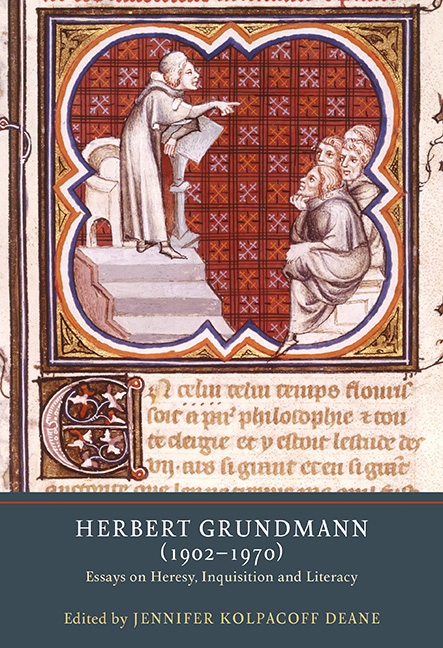Book contents
- Frontmatter
- Contents
- Acknowledgements
- Abbreviations
- Introduction
- Note on the Text
- 1 The Profile (Typus) of the Heretic in Medieval Perception
- 2 Women and Literature in the Middle Ages: A Contribution on the Origins of Vernacular Writing
- 3 Litteratus–Illitteratus: The Transformation of an Educational Standard from Antiquity to the Middle Ages
- 4 Heresy Interrogations in the Late Middle Ages as a Source-Critical Problem
- 5 Oportet et Haereses Esse: The Problem of Heresy in the Mirror of Medieval Biblical Exegesis
- 6 Learned and Popular Heresies of the Middle Ages
- 7 Obituary Essay (1970) by Arno Borst [annotations by Dr Letha Böhringer]
- 8 Bibliography of Herbert Grundmann
- Index
- YORK MEDIEVAL PRESS: PUBLICATIONS
1 - The Profile (Typus) of the Heretic in Medieval Perception
Published online by Cambridge University Press: 19 March 2020
- Frontmatter
- Contents
- Acknowledgements
- Abbreviations
- Introduction
- Note on the Text
- 1 The Profile (Typus) of the Heretic in Medieval Perception
- 2 Women and Literature in the Middle Ages: A Contribution on the Origins of Vernacular Writing
- 3 Litteratus–Illitteratus: The Transformation of an Educational Standard from Antiquity to the Middle Ages
- 4 Heresy Interrogations in the Late Middle Ages as a Source-Critical Problem
- 5 Oportet et Haereses Esse: The Problem of Heresy in the Mirror of Medieval Biblical Exegesis
- 6 Learned and Popular Heresies of the Middle Ages
- 7 Obituary Essay (1970) by Arno Borst [annotations by Dr Letha Böhringer]
- 8 Bibliography of Herbert Grundmann
- Index
- YORK MEDIEVAL PRESS: PUBLICATIONS
Summary
‘The History of Heresy’ is a subject that strikes modern ears as old fashioned, a research topic from a bygone era. It evokes thick folios and historians motivated by theology or even dogma – for example, Sebastian Franck and Flacius, Gottfried Arnold and Mosheim, Fuesslin or Walch. Yet this very sense of distance between their research world and ours should give us pause; those same men played such formidable roles in analysing medieval heresy over the centuries that one can discern a significant portion of our intellectual history within the history and turning points of ‘heresy studies’. Is there not therefore a deeply intractable problem lying within that intellectual history? And should we assume that this problem has already been resolved or managed for us? Certainly not resolved. For several reasons, we are no longer confident that those earlier works, documents of their own time, can teach us to recognise and understand heresy in the Middle Ages. First of all, our knowledge has since been incomparably expanded in detail and clarified through the critical work of the nineteenth century. Those efforts yielded new editions and analyses, including inquisitorial protocols and treatises on heresy, and enabled distribution of these new understandings in summary form – most impressively in the History of the Inquisition by the American H. C. Lea. Yet this body of work is not sufficient to meet today’s demands on medieval intellectual-historical knowledge. For while recent sociological reflection has taught us much about the socio-ethical aspects of heresy, it offers little about its historical and intellectual significance; the ‘sects’ remain largely inexplicable, treated as separate phenomena without meaningful connection vis-a-vis each other, or to the ‘actual’, official Middle Ages to whose historical margins they are relegated. Thus do their origins and trajectories remain unclear, their importance in the general life of the times misunderstood.
In fact, the very process of research in intellectual history fundamentally negates the possibility of a distinct ‘history of heresy’, as it does not recognise a definitive break between ‘heretical’ and ‘orthodox’; one will never successfully find a meaningful, internally coherent, seamless development of ‘Heresy’. On the contrary, every heretical movement must be understood as a single intelligible facet of the broader spiritual development of its time.
- Type
- Chapter
- Information
- Herbert Grundmann (1902–1970)Essays on Heresy, Inquisition, and Literacy, pp. 16 - 29Publisher: Boydell & BrewerPrint publication year: 2019

